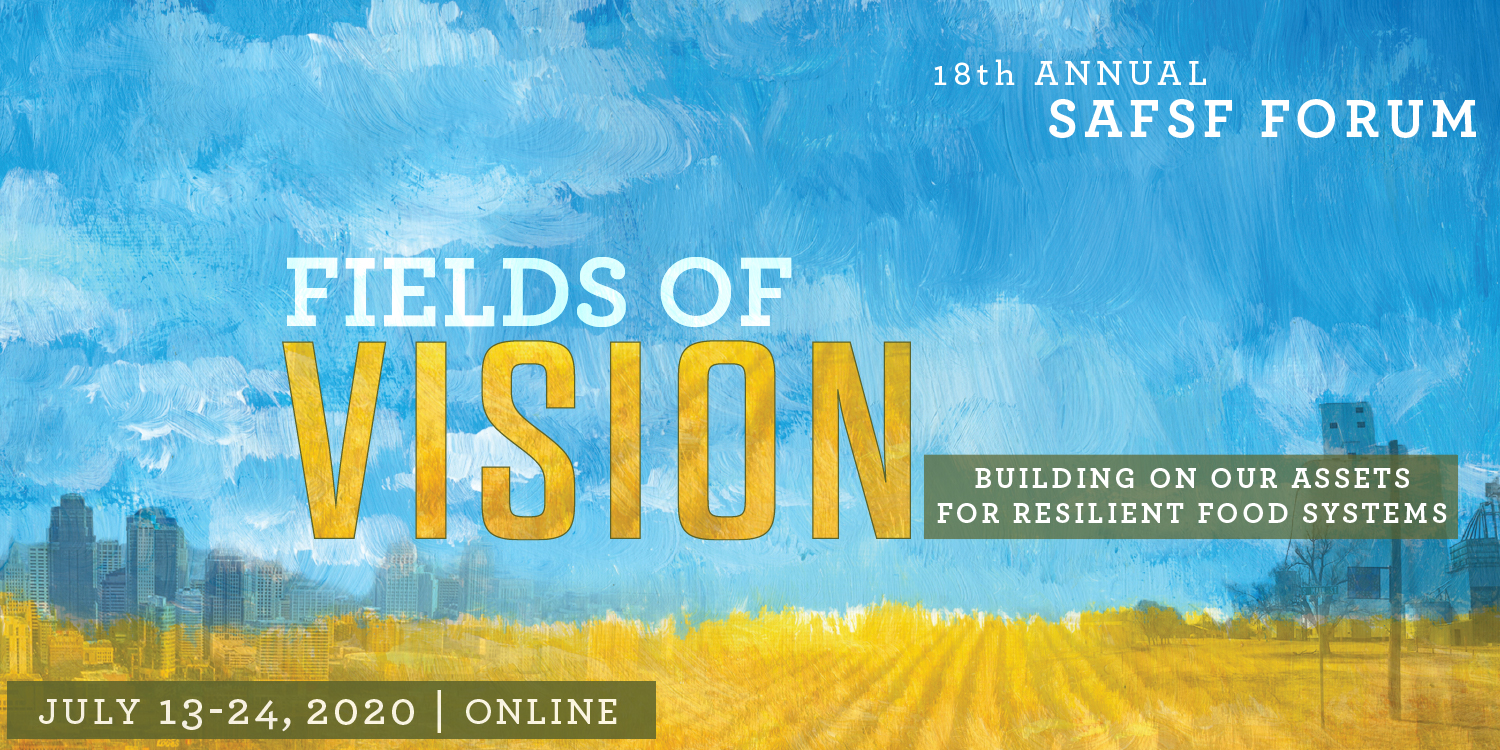
Events
Forum 2020
- This event has passed.
Forum 2020
January 13, 2021 @ 7:00 am – January 24, 2021 @ 7:00 pm EST
About the Forum
SAFSF amplifies the impact of philanthropic and investment communities in support of just and sustainable food and agriculture systems, and the SAFSF Forum is the only national gathering for and by funders supporting just and sustainable food systems change. The Forum challenges participants to understand the need for grantmakers and investors to take on risks in order to co-create more resilient, sustainable, and equitable food systems—and at the same time, provides space to cultivate connections with peers so that no one organization is going it alone.
The SAFSF Forum is moving online to bring you the opportunities for real-life learning and peer connection that funders look forward to all year. Spanning two weeks, from July 13-24, the 2020 SAFSF Forum is a curated assortment of thought-provoking, timely, and diverse programming developed by your SAFSF funder peers. With a range of workshop and networking sessions offered over two weeks, put together the schedule that works for your learning:
- Tune in live and participate in dynamic discussions with expert speakers
- Listen to session recordings at a time that works for you
- Connect and network with funder and investor peers working across the country
And because the Forum theme and agenda is developed by and for funders who are working on a variety of issues, approaches, and geographies, attendees will leave with inspiration, strategies, and connections for impactful engagement related to their own work within the food system.
Forum Theme
The 2020 Forum theme, Fields of Vision: Building on Our Assets for Resilient Food Systems, encourages participants to explore our fields of view by:
- Focusing on immediate critical needs and assets
- Looking beyond our own organizations and localities to build relationships with strategic allies and partners
- Zooming out to map the complex systems and leverage points that will support health, equity, solidarity, and resilience widely and for the long term
Forum offerings will reflect on this theme and be informed by the impacts of the coronavirus pandemic on our food and agricultural systems.
REGISTRATION RATES
$250 SAFSF Member | $325 Non-Member Funder | $250 Food System Partner* | $250 Affinity Group Staff
* Food System Partner registration is a member benefit. Email forum@safsf.org if you have questions about this member benefit.
WHO IS A “FUNDER”?
The annual SAFSF Forum is designed by and for funders. Funders are considered those organizations using grantmaking or investments as a core strategy to fulfill their mission and who make grants or invest more than $50,000 annually. This includes individual donors, executive and program staff, and members of the board of grantmaking organizations (family foundations, individual donors, corporate foundations, government, community foundations, etc.), as well as representatives of non-profit or for-profit investment enterprises. Development or fundraising staff are not permitted to participate in SAFSF events.
2020 FORUM PLANNING COMMITTEE
J. Olu Baiyewu, Food Well Alliance, GA
Alyssa Banks, Greater Twin Cities United Way, MN
Ila Duncan, The Lumpkin Family Foundation, NY
Devin Foote, W.K. Kellogg Foundation, MI
Leslie Hatfield (chair), GRACE Communications Foundation, NY
Christine James, The John Merck Fund, MA
Bob Scowcroft, The Nell Newman Foundation, CA
Elizabeth Stewart Burger, The Sunflower Foundation, KS
Jeff Usher, Kansas Health Foundation, KS
Gwen Wurst, Greater Kansas City Community Foundation, MO
Program
Week 1: Monday, July 13 – Friday, July 17
MONDAY 7/13
7 AM HST | 9 AM AKDT | 10 AM PT | 11 AM MT | 12 PM CT | 1 PM ET (90 min)
TRANSFORMATIONAL FOOD SYSTEMS PHILANTHROPY
How can foundations and investors seize this moment to shift power that can lead to the true democratization of agricultural production, food systems, and philanthropy?
Presented by: SAFSF The extraction and concentration of resources––land, wealth, power––by a relative few is at the root of many of today’s agriculture, climate, and food system challenges; the COVID-19 pandemic has only intensified those challenges. Resource concentration is also the foundation of our century-old system of philanthropy and a key feature of our national and global economies. The pandemic has spurred some in philanthropy to shift more resources and power to communities while in rapid-response mode. How can foundations and investors seize this moment to shift power that can lead to the true democratization of agricultural production, food systems, and philanthropy? Moderator: Christine James, executive director, The John Merck Fund, VT Speakers: Ellen Dorsey, executive director, Wallace Global Fund, DCRodney Foxworth, chief executive officer, Common Future, CA
Details
- Start:
- January 13, 2021 @ 7:00 am EST
- End:
- January 24, 2021 @ 7:00 pm EST
- Event Categories:
- Event Slider, SAFSF Forum
